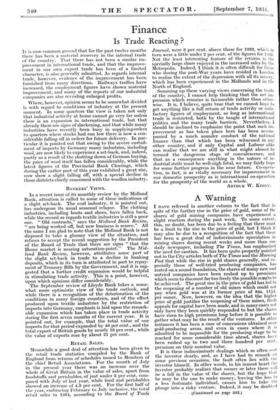Finance
Is Trade Reacting ?
IT is now common ground that for the past twelve months there has been a material recovery in the internal trade of the country. That there has not been a similar im- provement in international trade, and that the improve- ment in our own export trade has been of a limited character, is also generally admitted. As regards internal trade, however, evidence of the improvement has been furnished from many directions. Railways traffics have increased, the employment figures have shown material improvement, and many of the reports of our industrial companies are also revealing enlarged profits.
Where, however, opinion seems to be somewhat diVided is with regard to conditions of industry at the present moment. In some quarters the view is taken not only that industrial activity at home cannot go very far unless there is an expansion in international trade, but that already there are signs of slackening, and that while many industries have recently been busy in supplying orders to quarters where stocks had run low there is now a con- siderable falling off in orders for future delivery. In par- ticular it is pointed out that owing to the severe curtail- ment of imports by Germany many industries, including wool, are now likely to experience a set-back, and, indeed, partly as a result of the shutting down of German buying, the price of wool itself has fallen considerably, while the latest figures of the Provincial Bank Clearings, which during the earlier part of this year exhibited a great rise, now show a slight falling off, with a special decline in those districts chiefly concerned with the woollen industry.
BANKERS' VEEWS.
In a recent issue of its monthly review by the Midland Bank, attention is called to some of these indications of a slight set-back. The coal industry, it is pointed out, has undergone its usual seasonal relapse. The clothing industries, including boots and shoes, have fallen back, while the record as regards textile industries is still a poor one. "Old contracts," says the Midland Bank Review, "are being worked off, but new business is scarce." All the same I am glad to note that the Midland Bank is not disposed to take a gloomy view of the situation, and refuses to accept the recent suggestion by the President of the Board of Trade that there are signs "that the Home market is nearing saturation-point." The Mid- land Bank Review, however, attributes some part of the slight set-back in trade to a decline in banking deposits, which in its turn is attributed in part to repay- ment of Treasury Bills by the Government, and it is sug- gested that a further credit expansion would be helpful in stimulating trade activity. This is a point, however, upon which opinions differ considerably. The September review of Lloyds Bank takes a some- what more optimistic view of the trade outlook, and while there is a recognition of the deterioration of the conditions in many foreign countries, and of the effect produced upon textile industries by the restriction of Imports into Germany, emphasis is laid upon the remark- able expansion which has taken place in trade activity during the first seven months of the current year. It is pointed out, for example, that the total value of our imports for that period expanded by 46 per cent., and the total export of British goods by nearly 18 per cent., while the value of exports rose by about 21 per cent.
RETAIL SALES.
Meanwhile a good deal of attention has been given to the retail trade statistics compiled by the Bank of England from returns of schedules issued to Members of the chief Retail Associations. For the month of July in the present year there was an increase over the whole of Great Britain in the value of sales, apart from foodstuffs and perishables, of just under 2 per cent. com- pared with July of last year, while food and perishables showed an increase of 4.3 per cent. For the first half of the year, embracing February to July inclusive, the total retail sales in 1934, according to the Board of Trade Journal, were 3 per cent, above those for 1933, which in turn were a little under 2 per cent, of the figures for 1932. Not the least interesting feature of the returns is the specially large share enjoyed in the increased sales by the Metropolis. Indeed, I think it is often difficult for those who during the post-War years have resided in London to realize the extent of the depression with all its misery, which has been experienced in the Midlands and in the North of England.
Summing up these varying views concerning the trade of the country, I cannot help thinking that the net im- pression which remains is favourable rather than other- wise. It is, I believe, quite true that we cannot hope to get anything like a full return of trade activity or satis- factory figures of employment, so long as international trade is restricted, both by the tangle of international politics and the many trade barriers. Nevertheless, I should be inclined to emphasize the point that such im- provement as has taken place here has been accom- panied by a much sounder conduct of the national finance than that which has been witnessed in any other country, and if only Capital and Labour alike can realize that we are still in what might almost be termed the dangerous stage of convalescence, and that as a consequence anything in the nature of in- dustrial strife must be well-nigh fatal, we may fairly hope for some further progress in the near future. Co-opera- tion, in fact, is as vitally necessary for improvement in our domestic prosperity as is international co-operation for the prosperity of the world as a whole. ARTHUR W. KIDDY.






































 Previous page
Previous page